Former President of India, Shri Ram Nath Kovind addresses the NHRC’s 32nd Foundation Day function in New Delhi
Former President of India, Shri Ram Nath Kovind addresses the NHRC’s 32nd Foundation Day function in New Delhi
The National Human Rights Commission (NHRC), India, organised a function and a National Conference on the ‘Human Rights of Prison Inmates’ to celebrate its 32nd Foundation Day at Vigyan Bhawan, New Delhi today. The Commission was set up on 12th October in 1993. Addressing the function as the Chief Guest, the Former President of India, Shri Ram Nath Kovind said that long before the modern articulation of human rights, our sages and scriptures spoke of the duty to uphold dharma, act with compassion and ensure justice. This enduring ethical foundation continues to guide us even today. It reminds us that the protection of human rights is not only a legal obligation but also a spiritual and moral imperative, which is integral to the Indian way of life.
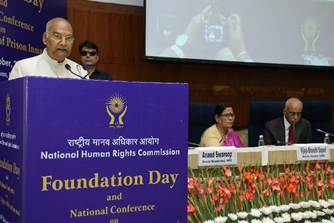
Shri Kovind said that India has built a robust and comprehensive framework of human rights. The NHRC, India, since its inception in the year 1993, has evolved into one of the most respected human rights institutions in the world. Commemorating its 32nd Foundation Day is more than just an institutional milestone. It is an occasion to reaffirm our collective commitment to the timeless values of justice, liberty, equality and fraternity enshrined in our Constitution. He said that through its investigations, advisories, interventions and advocacy, the Commission has given voice to the voiceless and brought human rights concerns into the heart of governance. It has reaffirmed India’s civilisational ethos that the true measure of a society lies in how it treats its most vulnerable member.
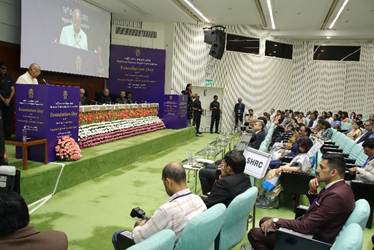
Shri Kovind said that while celebrating the progress made over the past three decades, we must also recognise the emerging and complex challenges of our times in an age of unprecedented technological, environmental and societal transformation, the human rights of workers in informal sectors such as drivers, sanitation workers, construction labourers and countless migrant workers are getting impacted the most. Those who keep our cities and streets running endure too often unsafe working conditions, irregular incomes and the absence of social protection risking their human rights frequently. As their labour sustains our growth; so their welfare and dignity should serve as a measure of our success. Economic progress must always walk hand in hand with human dignity.
Shri Kovind also raised concerns on climate change-related challenges impacting human rights due to migrations and displacements. He said that every person, regardless of his status deserves identity, security and access to essential services. He said that mental health in today’s context also deserves recognition as a human right and lauded NHRC’s advisories in this regard.
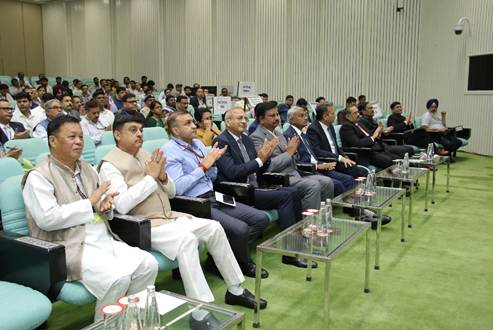
The Former President said that human right of prison inmates is a subject of profound importance. The true test of the society’s values lie in how it treats those who are most vulnerable including the people in the custody. It is the sacred duty of prison authorities to ensure that every inmate is treated with the basic courtesies owed to every human being. He expressed happiness that the Commission is organising a National Conference on the ‘Human Rights of Prison Inmates’ to promote gender sensitive and child-friendly practices within our prisons. These should not be merely places of confinement but as spaces of reform, rehabilitation and hope. He urged all the stakeholders and especially the prison officers to build an enabling environment where every inmate is given the opportunity to re-integrate into the society as a responsive citizen.
Shri Kovind also lauded the efforts of the governments in India over the years to improve the lives of all citizens, especially those at the bottom of the pyramid by giving access to sanitation, electricity, healthcare, education, and housing as a fundamental aspect of human rights. He also commended the repealing of archaic laws and simplification of procedures for ease of living. He said that landmark enactments such as the Mental Healthcare Act, 2017 and the Transgender Persons (Protection of Rights) Act, 2019 further demonstrate our nation’s unwavering commitment to protecting and promoting the rights of every individual.
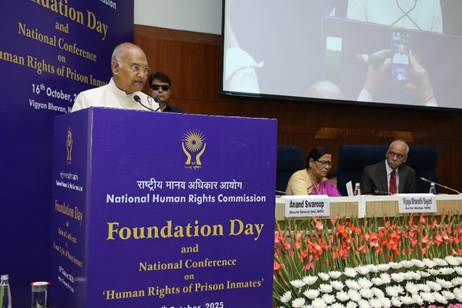
The Former President of India said that our Constitution reminds us that rights come with duties. Freedoms must be exercised in harmony with the common good. In the same spirit, safeguarding human rights is not just the responsibility of NHRC, it is our collective responsibility. On this Foundation Day of the NHRC, let us reaffirm our commitment to building a more humane, just and inclusive India which truly reflects the spirit of Sarve Bhavantu Sukhinah. He urged that everybody in society should strive to ensure that justice, equality and compassion are not merely ideals, but lived realities for all of our citizens.
Earlier, the NHRC Chairperson, Justice Shri V. Ramasubramanian gave an insight into the Commission’s work in the past 32 years and said that the Commission has handled more than 23 lakh cases and about 2,900 cases of suo motu cognizance. It has recommended monetary relief of more than Rs 263 crore in about more than eight thousand cases to the victims of human rights violations. These cases include around 73 thousand complaints and more than 100 suo motu registered during the last one year since October, 2024. During this period, the Commission conducted 63 spot enquiries; disposed of more than 38 thousand cases and recommended more than Rs 9 crore as monetary relief in about 200 cases to the victims of human rights violations. The NHRC has also collaborated with various institutions to conduct human rights awareness programmes.
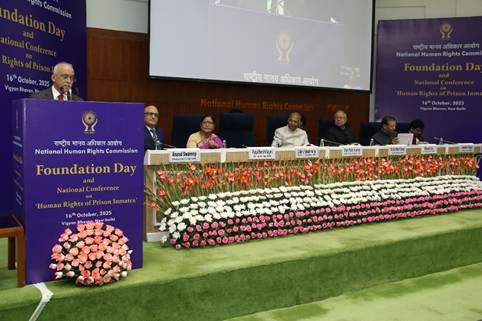
Justice Ramasubramanian said that the NHRC, India has constituted 12 core groups of experts, NGOs and senior government functionaries on various thematic issues related to human rights to help formulate mechanisms to evaluate the schemes initiated by the Government and make recommendations for improvements. He highlighted the subjects of three core group meetings and 4 open house discussions besides the capacity building programmes for students, All India Services Officers and the senior functionaries of the NHRIs of Global South organised over the past year. Underscoring the takeaways of the interactions with the senior functionaries of NHRIs, he particularly mentioned the suggestion that came up for formation of a forum of Global South NHRIs.
Shri Ramasubramanian said that the Commission with the able guidance of the Hon’ble Members and the effective assistance of the staff has been striving to live up to the standards set by our illustrious predecessors and to fulfill the legitimate expectations of the victims of human rights violations.
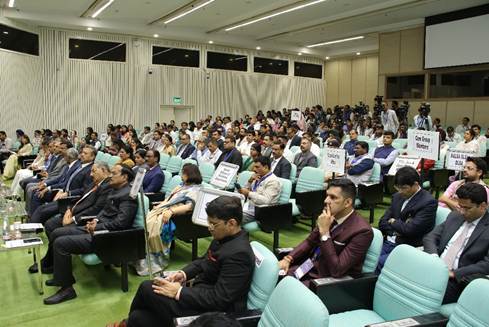
Before this, in his welcome address, Shri Bharat Lal, NHRC Secretary General said that the Commission has sought to serve as the conscience keeper of human rights in our democracy through its various interventions for protecting human rights of all and particularly the dignity of the most vulnerable and marginalised people in the country.
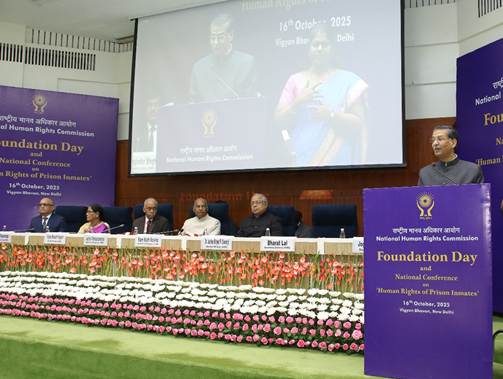
He said that NHRC’s core strength lies in its ethical and moral leadership. The biggest asset of the Commission is the respect it commands and the trust people, especially the vulnerable, have in its functioning. Of late, the NHRC has been focussing on capacity building and sensitisation through training of senior police and correctional officers, seminars on various issues to build empathy and accountability within governance systems. Citizens even in remotest villages can now file complaints in any of the 22 languages and track their progress online through the Human Rights Commission Network (HRCNet), linked to over five lakh Common Service Centres, which is a true step toward inclusion and accessible justice.
Shri Lal said that NHRC, India’s role has also expanded at international level. The Commission has played an active role in Global Alliance of NHRIs, Asia Pacific Forum and Commonwealth Forum of NHRIs. In recent years, the Commission has been engaging with the NHRIs of Global South on various dimensions of human rights. These initiatives reflect India’s commitment and contribution in strengthening human rights globally. Yesterday India was elected unopposed to Human Rights Council for a 3-year term (2026 – 28) starting next year for 7th time. This election reflects India’s unwavering commitment to human rights and its global standing.
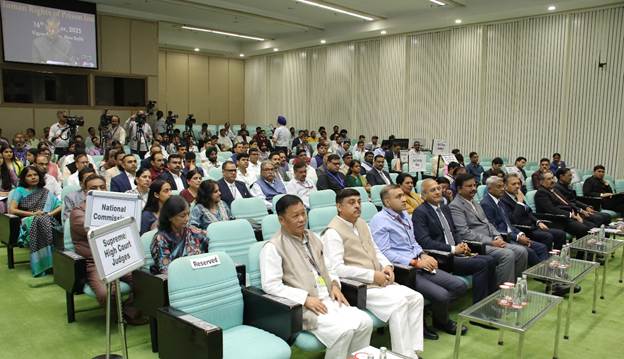
The NHRC, India Members, Justice (Dr) Bidyut Ranjan Sarangi and Smt Vijaya Bharathi Sayani, DG (I), Shri Anand Swaroop, Registrar (Law), Shri Joginder Singh, Joint Secretary, Shri Samir Kumar, Chairperson and Members of State Human Rights Commissions and other Commissions, judges of High Courts, senior government officers, academia, NGOs, human rights defenders, researchers, senior prison officers, among others attended the function. The Commission is also organising a day-long National Conference on the ‘Human Rights of Prison Inmates.’